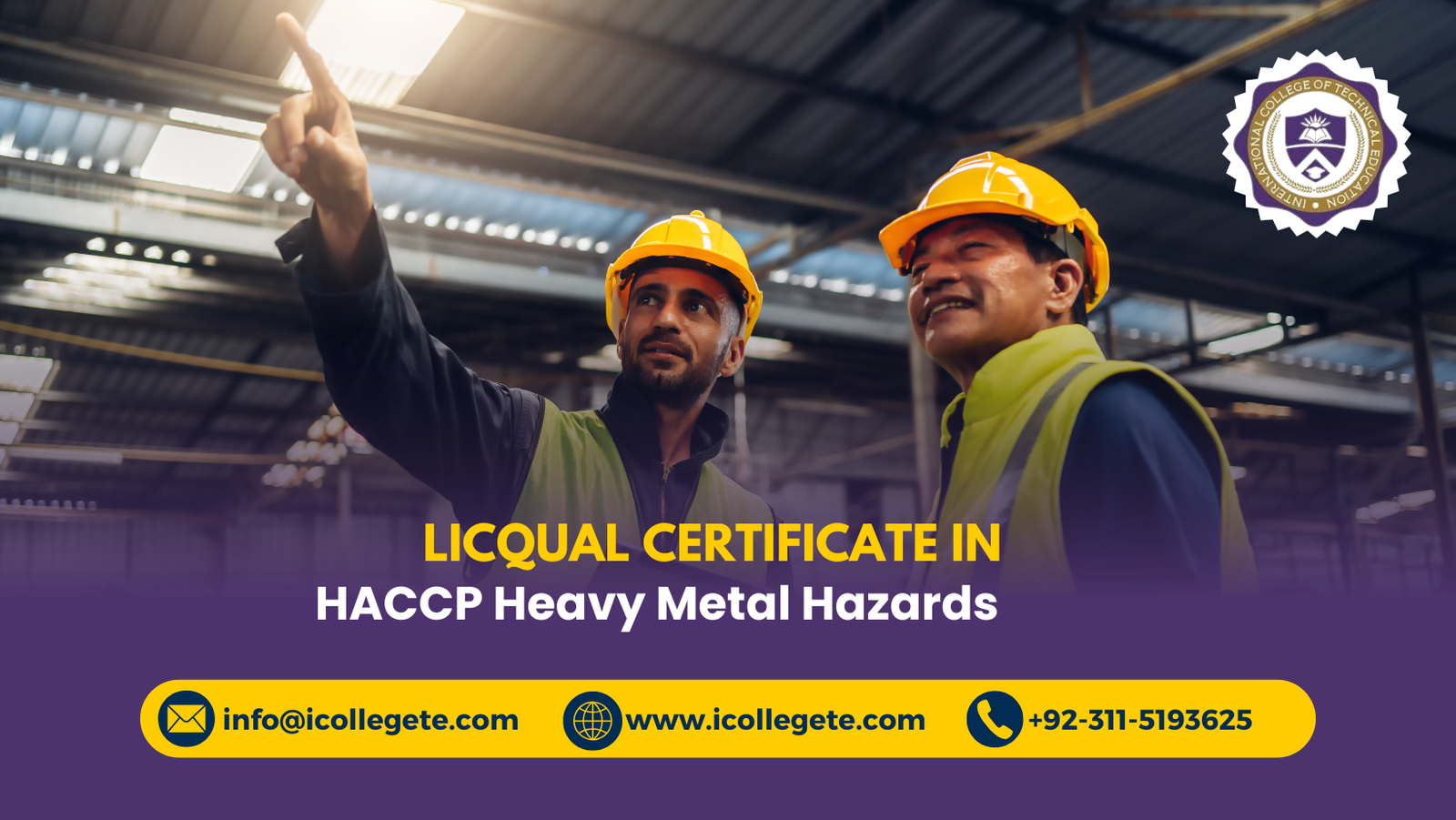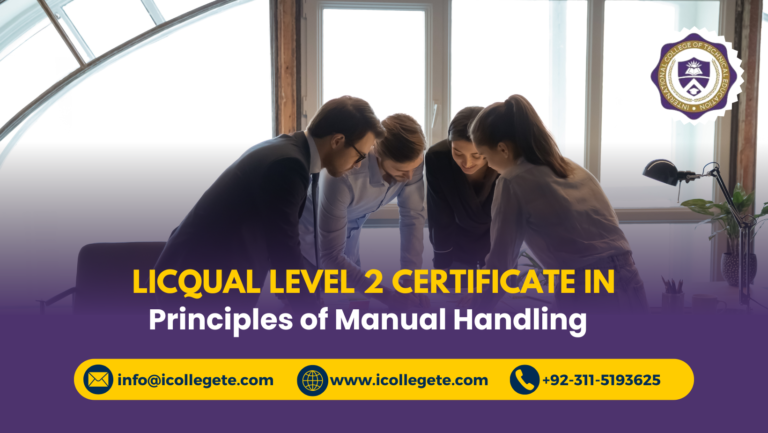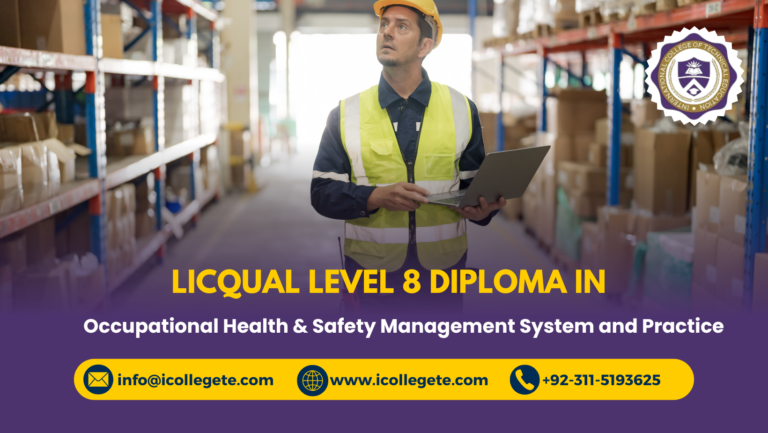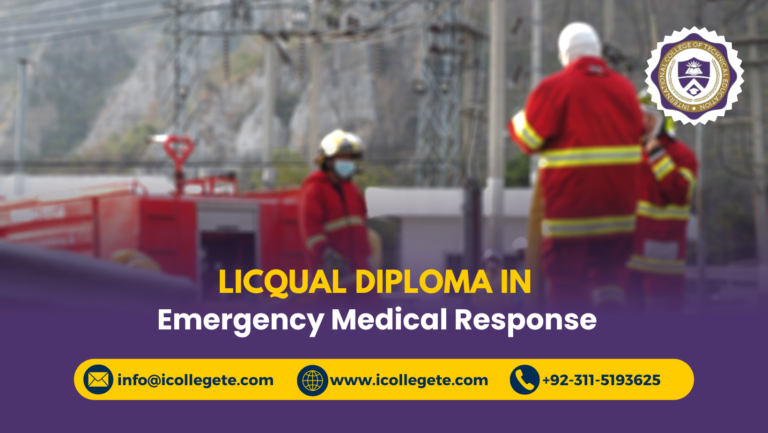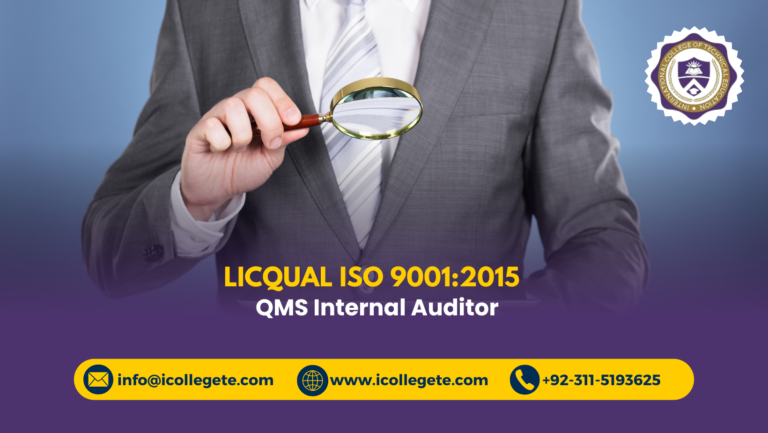In the food industry, ensuring the safety of the products you sell is crucial. One particular area of concern is heavy metal contamination, which can pose serious health risks to consumers. To help professionals mitigate this risk and ensure food safety, the LICQual Certificate in HACCP Heavy Metal Hazards offers an in-depth understanding of Hazard Analysis Critical Control Points (HACCP) as it relates specifically to heavy metals in food.
This UK-regulated certification is designed for those working in food safety management, and it’s entirely assignment-based, making it accessible and flexible for global learners. With this certification, you will gain the knowledge and tools necessary to prevent heavy metal contamination in food products, while ensuring that you are compliant with international food safety standards.
The LICQual Certificate in HACCP Heavy Metal Hazards is a specialized qualification that focuses on the risks associated with heavy metal contamination in food. Heavy metals like lead, mercury, cadmium, and arsenic are naturally occurring substances that can be harmful to health if consumed in excess. Understanding how these metals enter the food chain and how to mitigate their risks is a crucial aspect of food safety.
This course provides learners with an in-depth understanding of how to identify, control, and eliminate heavy metal contamination risks using the HACCP system. It’s ideal for professionals working in food production, processing, and safety roles, ensuring they have the expertise to maintain food safety and meet regulatory standards.
Delivered entirely through assignments, this course offers a flexible, self-paced learning experience. Upon successful completion, learners will earn a globally recognized UK certification, which is applicable to various sectors of the food industry worldwide.
Course Overview
The LICQual Certificate in HACCP Heavy Metal Hazards equips learners with the knowledge and practical skills needed to manage the risks associated with heavy metal contamination in food. The course delves into the HACCP system and how it can be tailored to address heavy metal hazards, ensuring food safety protocols are followed at every stage of production, processing, and distribution.
The course is entirely assignment-based, making it flexible for professionals working in busy food safety or production roles. With a focus on hazard analysis and critical control points (CCPs), this certification allows individuals to build or strengthen their food safety management systems, ensuring that food products meet the highest standards of safety.
Course Study Units
The LICQual Certificate in HACCP Heavy Metal Hazards consists of several key modules, which will provide learners with the expertise needed to identify and control heavy metal contamination in food. The study units include:
1. Introduction to HACCP and Food Safety
- Overview of HACCP principles.
- Importance of food safety management systems.
- Understanding the risks of heavy metals in the food supply chain.
2. Heavy Metal Contamination in Food
- Identifying common heavy metals found in food.
- Understanding the sources of contamination (e.g., soil, water, processing equipment).
- Health risks associated with heavy metal consumption.
3. HACCP Principles for Managing Heavy Metal Hazards
- Applying HACCP principles to control heavy metal contamination.
- Conducting hazard analysis to identify critical control points (CCPs).
- Risk assessment and management strategies for heavy metal hazards.
4. Monitoring and Preventing Heavy Metal Contamination
- Setting up effective monitoring systems for heavy metal hazards.
- Control measures and interventions to prevent contamination.
- Best practices for reducing the presence of heavy metals in food products.
5. Testing and Verification Methods
- Techniques for testing and detecting heavy metals in food products.
- Using laboratory tests to verify the safety of food.
- Ensuring the accuracy and reliability of testing methods.
6. Food Safety Regulations and Compliance
- Understanding international regulations and standards regarding heavy metal limits in food.
- Regulatory requirements for food safety in the UK and abroad.
- How to maintain compliance with food safety laws and certifications.
7. Corrective Actions and Record Keeping
- How to implement corrective actions when heavy metal contamination is detected.
- The importance of documentation and record-keeping in HACCP systems.
- Auditing and reviewing HACCP plans to ensure continuous food safety.
Learning Outcomes
Upon successful completion of the LICQual Certificate in HACCP Heavy Metal Hazards, learners will be able to:
- Understand the principles of HACCP and its application in managing heavy metal contamination risks.
- Identify and evaluate potential heavy metal hazards in the food supply chain.
- Implement and monitor HACCP-based systems to control heavy metal contamination in food products.
- Conduct risk assessments and establish critical control points (CCPs) related to heavy metal hazards.
- Apply food safety regulations to ensure compliance with international standards for heavy metal contamination.
- Design and implement corrective actions and maintain proper documentation for HACCP systems.
Course Benefits
The LICQual Certificate in HACCP Heavy Metal Hazards offers numerous benefits for both individuals and businesses:
- Globally Recognized Certification: This UK-based certification is widely accepted worldwide, making it a valuable qualification for food safety professionals.
- Flexible, Assignment-Based Learning: With an entirely assignment-based course structure, learners can study at their own pace, making it ideal for professionals balancing work and study.
- Specialized Knowledge in Heavy Metal Hazards: This certification provides targeted knowledge in an area of growing concern—heavy metal contamination—enhancing your ability to manage risks effectively.
- Improved Food Safety Standards: By applying HACCP principles to heavy metal hazards, you’ll help your organization maintain the highest levels of food safety and protect consumer health.
- Regulatory Compliance: Gain the skills to ensure compliance with food safety laws and avoid potential legal and financial penalties associated with food safety violations.
- Career Advancement: The specialized knowledge gained from this certification opens up opportunities for career growth in food safety management, quality control, and regulatory compliance.
Who Can Enroll in This Course?
The LICQual Certificate in HACCP Heavy Metal Hazards is ideal for professionals who are involved in food safety, production, and quality control in industries that deal with food manufacturing, processing, and distribution. The course is particularly relevant for:
- Food Safety Managers and Quality Control Supervisors responsible for ensuring food safety within food production or retail establishments.
- Food Production Workers involved in handling food, especially those in roles that require oversight of food safety protocols.
- Food Safety Auditors and Compliance Officers looking to expand their expertise in heavy metal contamination risks.
- Managers in Food Processing and Manufacturing who need to implement and oversee food safety systems within their organizations.
- Laboratory Technicians and Testing Professionals who analyze food safety and contamination risks.
No prior HACCP certification is required, although experience in the food industry is beneficial for understanding the course material.
Future Progression
After completing the LICQual Certificate in HACCP Heavy Metal Hazards, you can explore various progression routes to enhance your career:
- Advanced HACCP Qualifications: You can pursue higher-level HACCP certifications, such as the LICQual Level 4 HACCP for Manufacturing or Advanced HACCP for Food Safety, to specialize further in food safety management.
- Specialization in Food Safety Areas: If you’re interested in other areas of food safety, consider certifications in Food Fraud Prevention, Food Allergen Management, or Food Quality Management.
- Food Safety Management Roles: With this qualification, you can move into more senior roles in food safety management, such as Food Safety Manager, Compliance Officer, or Regulatory Affairs Manager.
- Consultancy and Auditing: With expertise in HACCP and heavy metal hazards, you can explore career opportunities as a food safety consultant or auditor, helping businesses manage their food safety systems and ensure compliance.
- Regulatory and Legal Specialization: If you’re interested in regulatory affairs, you can explore roles in government food safety agencies or compliance auditing, ensuring that businesses meet both national and international food safety standards.
The LICQual Certificate in HACCP Heavy Metal Hazards provides specialized knowledge and practical skills to effectively manage the risks of heavy metal contamination in food. This certification is globally recognized, UK-regulated, and delivered through flexible, assignment-based learning, making it ideal for busy professionals in the food industry.
By completing this course, you will be equipped to enhance food safety in your workplace, reduce the risk of heavy metal contamination, and ensure compliance with international food safety standards.
If you’re looking to specialize in heavy metal hazards and advance your career in food safety, the LICQual Certificate in HACCP Heavy Metal Hazards is the perfect next step. Enroll today to secure your future in the ever-evolving food safety industry!
